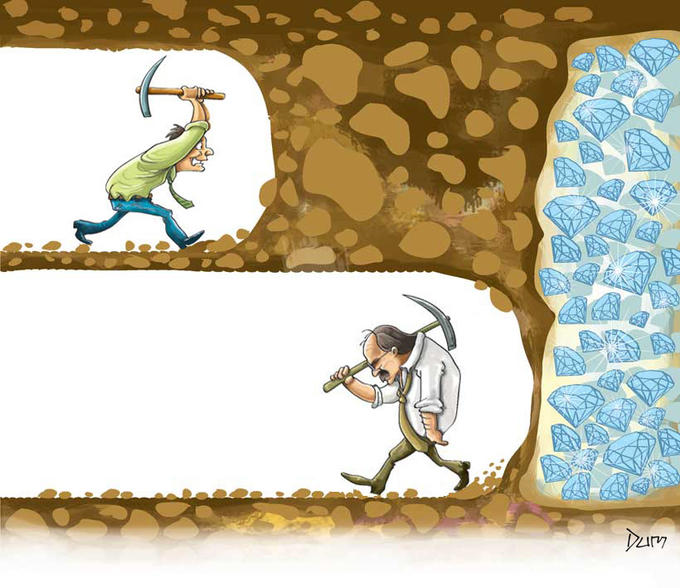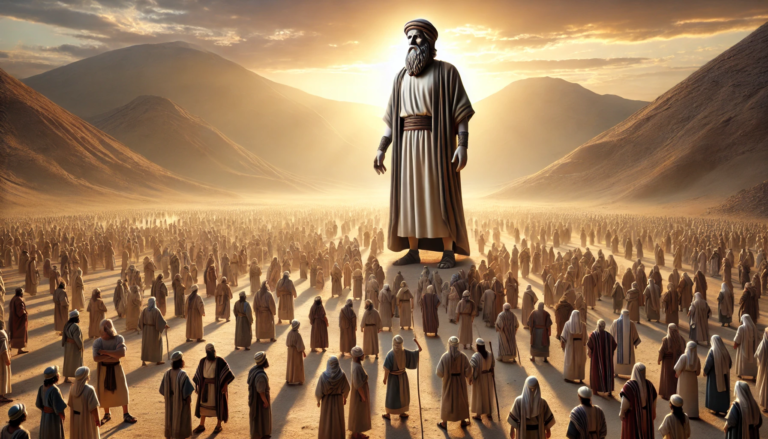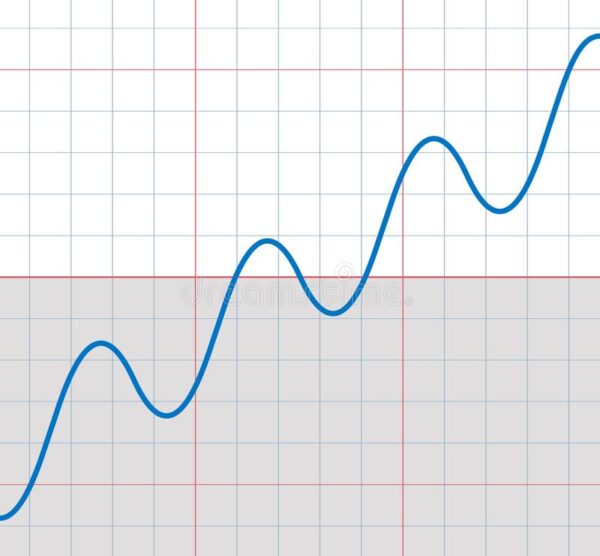How to Make Your Obstacles Disappear

The Importance of Desire:
Born into American slavery in 1856, Booker T. Washington was freed at the age of 9 when U.S. Troops, arriving the area in which he lived, enforced President Lincoln's Emancipation Proclamation. Teaching himself to read, he devoured every book he could get his hands on. He supported himself and paid for his higher education by working in salt furnaces and coal mines. At the age of 25, he became the first leader of what would became known as the Tuskegee Institute, leading it for over 30 years. He rose to such prominence as an educator, author and orator, that he became the first black person to publicly dine with a President of the United States. In short, he knew hardship but he equally knew hard work, and he achieved many, many things because of his desire and his determination. He famously said, "Success is to be measured not so much by the position that one has reached in life as by the obstacles which he has overcome."
Whether we revel in them or recoil from them, our lives are filled with obstacles. Therefore, it behooves us to take the time to learn about them, i.e. why they exist, where they come from, and how to benefit from them.
Our first point is a rather simple fact but perhaps overlooked for its simplicity. The magnitude and scope of all obstacles are not equal. Some obstacles are relatively insignificant while others are huge. What governing principle underlies this fact? The magnitude and scope of the obstacles that we face are directly correlated with the magnitude and scope of the goals that we wish to accomplish. For example, obstacles associated with starting a successful business are greater than those associated with learning to ride a bicycle, obstacles associated with learning to become proficient in a foreign language are greater than those associated with learning to bake a cake, and so on. Although this is obvious, why must it be this way?
Obstacles exist to ensure that we possess the necessary desire that is associated with the goal that we wish to achieve. Think of it like the price or cost of the goal. Every goal has a price tag associated with it. The cost of a goal is not measured in money but rather in desire. Big goals are expensive, i.e. they cost a lot of desire; small goals are cheap, they don't cost much (Likutei Moharan 66:4): וְעִקַּר גֹּדֶל הַחֵשֶׁק נַעֲשֶׂה עַל־יְדֵי הַמְּנִיעָה שֶׁמַּזְמִינִין לוֹ...וְזֹאת הַמְּנִיעָה הִיא בִּשְׁבִיל הַחֵשֶׁק, כְּדֵי שֶׁעַל יְדֵי זֶה יִהְיֶה לוֹ חֵשֶׁק יוֹתֵר לַעֲשׂוֹת אוֹתוֹ הַדָּבָר (The magnitude of the obstacle is determined by the level of desire that has been prepared for it...The obstacle is for the sake of the desire, in order that he will have a greater desire to accomplish the thing).
We need to internalize this so we don't become discouraged because this principle is equally true for spiritual goals. Let's say, for example, that we have decided to wake up for chatzot (halachic midnight), to mourn the churban of the Beit ha-Mikdash, the exile of the Shechinah, and to learn Torah throughout the rest of the night until morning when we intend to pray Shacharit at sunrise. Very lofty spiritual goals! Therefore, expect that Heaven will send us obstacles. It's as simple as that. We will be sent one obstacle after another, making it seem that, chas v'shalom, Heaven doesn't want us to rise for chatzot. But it's just the opposite. Because rising for chatzot is such an enormous achievement, it's price tag is high. Therefore, obstacles are sent to us in order to increase our yearning, our desire. But don't think that this is only relevant for 'big, lofty' goals. Everything is according to one's level. For one individual it might be the decision to put on tefillin every day, for another it might be to pray Shacharit every morning, for another it might be to read one page of Gemara each day, for another it might be to make aliyah, and so on.
What is this like? It is like a child who is shown something of great value that he really wants, and he gets very excited, but then immediately, the object is snatched away and hidden from him. What will happen next? The child will run after that person, begging and pleading for the desired object. Therefore, we should learn that desire and yearning emerges directly from the obstacles that are placed in our path – in this case, the distancing of the desired object from the child. This principle may also be learned from Mishlei 9:17: מַיִם־גְּנוּבִים יִמְתָּקוּ וְלֶחֶם סְתָרִים יִנְעָם (Stolen-waters are sweet, and hidden-bread is delightful). In explanation of the second half of this pasuk, R' Nachman of Breslov writes (L.M. 66:4): שֶׁכָּל מַה שֶּׁהַדָּבָר נִמְנָע וְנִסְתָּר מִן הָאָדָם בְּיוֹתֵר, הוּא חוֹשֵׁק אֵלָיו וְנָעִים לוֹ בְּיוֹתֵר (The more a thing is withheld and hidden from a person, the more he desires and delights in it). Therefore, the purpose of all obstacles (at least in the realm of kedushah) is to increase our desire.
This revelation leads us to our next truth about obstacles. When one's desire has increased to the level where it is commensurate with the goal, then the obstacles will just simply disappear (L.M. 66:4): וְעַל כֵּן כְּשֶׁאָדָם חוֹשֵׁק בְּיוֹתֵר, בְּוַדַּאי יוּכַל לַעֲשׂוֹת הַדָּבָר, וְיוּכַל לְהוֹצִיאוֹ מִכֹּחַ אֶל הַפֹּעַל...כִּי הַחֵשֶׁק מְשַׁבֵּר הַמְּנִיעָה, כִּי עִקַּר הַמְּנִיעָה אֵינוֹ אֶלָּא בִּשְׁבִיל הַחֵשֶׁק כַּנַּ"ל, וְעַל כֵּן כְּשֶׁאָדָם חוֹשֵׁק בְּיוֹתֵר כְּפִי הַמְּנִיעָה, מִמֵּילָא נִשְׁבָּר הַמְּנִיעָה (Therefore, when a person desires more, for sure he will be able to do the thing [that he desires], and he will be able to bring it out from potential to actual...for desire breaks the obstacle, for the essence of the obstacle is only for the sake of the desire; therefore, when a person desires more, according to the [price tag associated with the] obstacle, then automatically the obstacle breaks). Instead of falling into despair, panic, or worry about the obstacles that seemingly arise 'out of nowhere' to prevent us from achieving our goals, we can rest assured that the obstacles are a gift from Heaven to help us acquire enough desire to 'pay for' the goal that we want to accomplish. If we don't give up on yearning for the thing of kedushah that we want to achieve, then in time, we will achieve it. The flip side of this is that the main reason we don't achieve our goals is because we really don't want to achieve them – because we think that the price tag is too high. and so we just walk away. However, instead of giving up, we need to beg and cry out to Hashem to increase our desire.
But maybe things aren't so cut and dry. Maybe life just isn't fair. Maybe Hashem sends me obstacles that are way more intense than the obstacles that He sends others. And it's not like we're immune from having this thought, for it is stated explicitly in L.M. II:46: וּלְכָל אֶחָד וְאֶחָד נִדְמֶה לוֹ שֶׁהַמְּנִיעוֹת שֶׁלּוֹ גְּדוֹלִים יוֹתֵר מִשֶּׁל חֲבֵרוֹ, וְקָשֶׁה לַעֲמֹד בָּהֶם (Everyone imagines that his obstacles are greater than those of his friend, and that it is difficult to handle them). So it will require a certain amount of honest self-reflection to admit this about ourselves. That's okay. We should take the time to search and see where we're holding. There's nothing wrong with that. Admitting the truth about ourselves is a crucial step in moving forward. And once we can accept truth about ourselves, we can accept the fact that Hashem is fair and that He gives to each person the obstacles that are commensurate with his level (L.M. II:46): דַּע, שֶׁלְּכָל אֶחָד אֵין לוֹ מְנִיעוֹת רַק כְּפִי כֹּחוֹ, כְּפִי מַה שֶּׁיָּכוֹל לָשֵׂאת וְלַעֲמֹד בָּהֶם אִם יִרְצֶה (You should know that everyone's obstacles are commensurate with his ability, according to what he can bear and handle, provided that he wants to).
But we can learn an even more astonishing chiddush: וּבֶאֱמֶת אֵין שׁוּם מְנִיעָה, כִּי גַּם בְּהַמְּנִיעָה בְּעַצְמָהּ מְלֻבָּשׁ שָׁם הַשֵּׁם יִתְבָּרַךְ (In reality, there is no such thing as an obstacle, because the obstacle itself is just a garment for Hashem). Hashem is right there in the midst of the obstacle, and what Hashem really wants is for us to yearn for Him! How come? Because that's how we fix and repair everything that we have damaged, how we effect our own healing, and how we perfect our own rectification. Therefore, when we use the 'obstacles' to increase our desire and yearning for the thing of kedushah that we seek, we are really increasing our desire and yearning for Hashem. In the example provided above, if we really want to wake up for chatzot, the desire to do this is really just a desire for Hashem. What we are really yearning for is to be closer to Hashem, to feel His pain and to give Him and the Shechinah comfort. Therefore, we see that so-called 'obstacles' are just a mask behind which Hashem hides – for our benefit.
Perhaps this is best illustrated with a story that the Baal Shem Tov used to tell. Once upon a time there was a king who hid a vast and awesome treasure behind many, many obstacles. The truth was, however, that he didn't really hide the treasure behind any obstacles at all. They were all just illusions. Each obstacle was a separate illusion. Many, many different kinds of illusions. People from all over the realm would come with the hope of getting the treasure, but one after the other, they would eventually all turn away. Some made it through one obstacle, others made it through a few, but no one was able to break through all of the obstacles to access the treasure. Eventually, however, the king's son came and broke through all of the obstacles and got the treasure. He knew that the obstacles were mere illusions, that there was no reality to any of them, and so he was able to break through them all. He confidently passed through each obstacle until he made it to the treasure.
So where are the greatest 'illusionary' obstacles that we face? They are inside our own heads (L.M. II:46): וְהַמְּנִיעָה הַגְּדוֹלָה שֶׁבְּכָל הַמְּנִיעוֹת הִיא מְנִיעַת הַמֹּחַ, דְּהַיְנוּ מַה שֶּׁמֹּחוֹ וְלִבּוֹ חֲלוּקִים מֵהַשֵּׁם יִתְבָּרַךְ אוֹ מֵהַצַּדִּיק (The greatest of all obstacles is the obstacle of the mind, i.e. the fact that one's mind and heart are divided concerning Hashem, may He be blessed, or concerning the Tzaddik). We are our greatest obstacles. Our greatest obstacles are not external to us, they are inside us, inside our own heads – questions, sadness, confusion, thoughts of heresy, etc. One minute, we feel strong and determined; the next minute, we waver. We go back and forth like a reed blown in the wind. What are supposed to do? We must cry out to Hashem from the depths of our heart, with true sincerity, and He will hear our cry and respond by strengthening our resolve, our emunah and bitachon, and granting us greater desire. For how long do we have to do this? We keep doing this – day after day, night after night – until the obstacles simply vanish. That is, if we really want what we say we want. In the end, we will experience something absolutely awe-inspiring. We'll say to ourselves, 'What happened? Where did all the obstacles go?' If you've never experienced this before, you'll be astonished.
It is like a craftsman who initially makes a mold for a vessel that he wants to create. He then uses the mold to create the vessel, and in the end, he'll benefit from the vessel itself. Our desire is the mold, achieving the goal is producing the vessel, and benefiting from the goal is using the newly-made vessel. Hashem wants us to have the biggest, most beautiful vessel possible. If we don't give up, we will merit tremendous purity and kedushah (L.M. 185): כִּי עַל־יְדֵי־זֶה זוֹכֶה אַחַר־כָּךְ לְקַבֵּל הַרְבֵּה קְדֻשָּׁה וְטָהֳרָה, כִּי עַל־יְדֵי הַיְגִיעוֹת שֶׁבַּתְּחִלָּה נַעֲשֶׂה הַכְּלִי, וְכָל מַה שֶּׁיֵּשׁ לוֹ יוֹתֵר יְגִיעוֹת וְטִרְחוֹת וְכוּ', יֵשׁ לוֹ כְּלִי גָּדוֹל בְּיוֹתֵר לְקַבֵּל אַחַר כָּךְ בְּתוֹכוֹ שֶׁפַע קְדֻשָּׁה וְטָהֳרָה לְהִתְקָרֵב לְהַשֵּׁם יִתְבָּרַךְ (Through this, one merits afterward to receive a great amount of kedushah and purity, for through the hard work that took place at the beginning, the vessel is made, and the more one labors and works hard, the greater his vessel will be to receive afterward within it an outpouring of kedushah and purity to draw close to Hashem, may He be blessed).
The biggest test in our generation is simply not to succumb to despair, depression and discouragement. If we can do this, then we will have triumphed. We should know that every effort we put into drawing closer to Hashem will be met with opposition – even from family and friends – but the opposition is a gift from Hashem to increase our capacity to receive His blessings, to create a greater and more beautiful vessel. If we internalize this truth, then when we fall (not if we fall), we will be able to get up and keep going.






